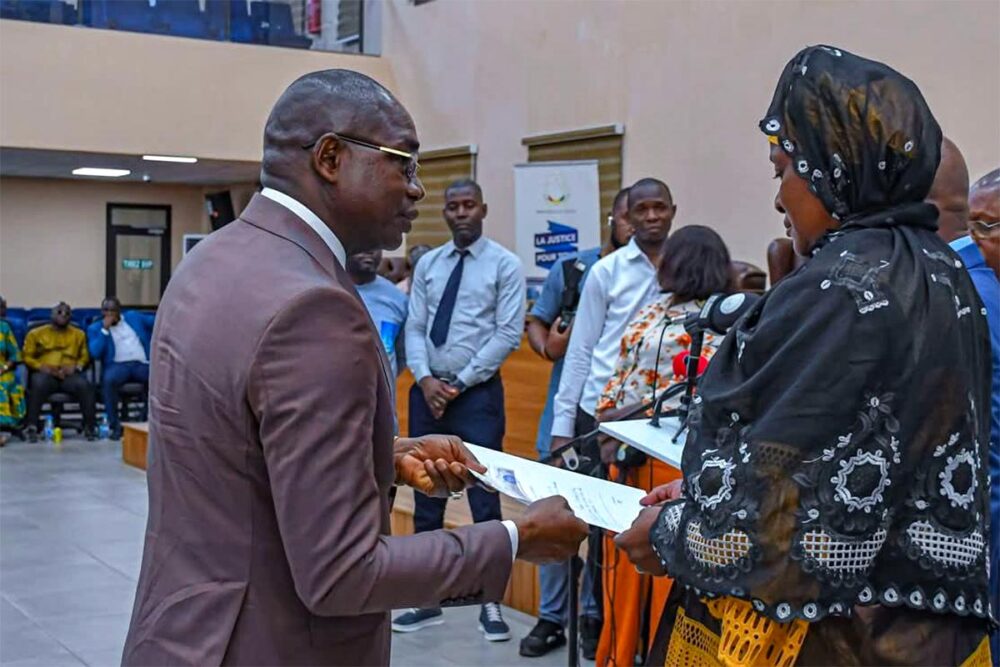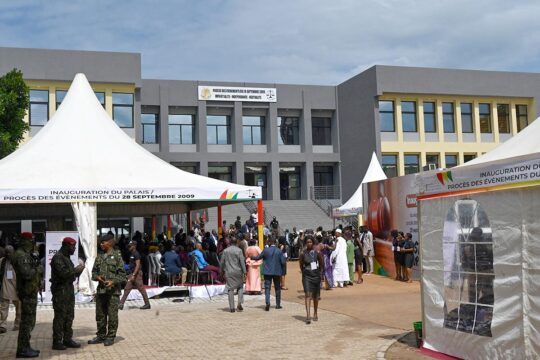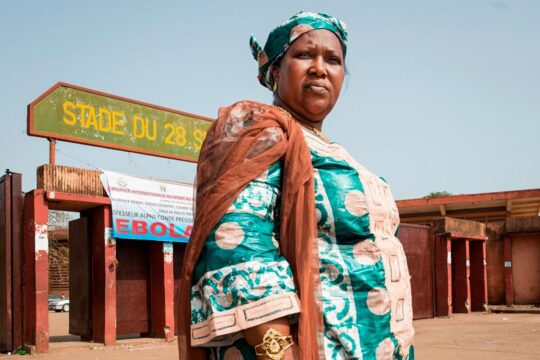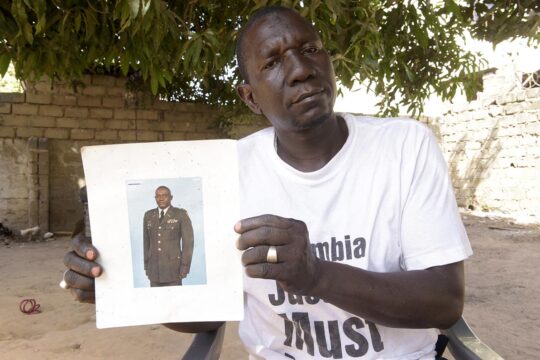In the Republic of Guinea, compensation for the victims of the 28 September 2009 massacre has begun, shortly after the announcement made on 26 March by a presidential decree read on national television. A total of 334 people are listed as civil parties in the judgment handed down by the Dixinn Court of first Instance, which conducted the trial between September 2022 and July 2024. Some have already received their compensation, while others have not yet. When questioned, the commission responsible for distributing the compensation declined to comment further.
However, in addition to these two categories, a third one has emerged and wants to be heard. This is the category of victims who did not register as civil parties. These people are increasingly turning to the media to draw the president’s attention to their situation.
Tuesday, 13 May 2025. A ceremony is organised by the ministry of Justice in the main hall of the Conakry Court of appeal, where the trial for the 28 September massacre took place. Several civil parties are present at this solemn gathering, dedicated to the handout of the first compensation payments. Some burst into tears when the minister of Justice took the floor: “We are gathered here today to implement the decree of the president of the Republic and to give the victims cheques for the amounts set and determined by the court decision,” said Yaya Kaïraba Kaba.
After the symbolic presentation of nine such cheques, the president of the Association of victims, parents and friends of 28 September 2009 (Avipa) welcomed the authorities’ decision to take responsibility for compensating the victims. “Today, I can breathe a sigh of relief. For the past 15 years, I thought for a long time that we would never get there, but today it is done! I am very happy to have witnessed this first handout of compensation payment and I pray to God that I will live to see the end of the process,” said Asmaou Diallo.
Compensation totalling 12 million euros
Abdoulaye Baldé has chaired the compensation commission set up by the ministry of Justice since 9 May 2025. Under the ruling, 334 people are to receive compensation totalling 117.9 billion Guinean francs, or approximately 12 million euros, he said. “We have drawn up a work plan dividing the victims into groups, taking into account the offences they suffered: women victims of rape, missing or dead persons, victims of assault and battery, and victims of looting of property. On this first day, our commission processed the cases of 11 people. Two were sent back because they did not have the necessary supporting documents,” Baldé said during the handout ceremony of the first nine compensation payments.
Since 13 May, other victims have been compensated. Women who were victims of sexual assault were the first ones to receive compensation, according to information gathered from the coordinator of the civil lawyers’ collective. Among the beneficiaries was a woman in her fifties who wishes to remain anonymous. She received a cheque for 1.5 billion Guinean francs (approximately 150,000 euros), as decided by the court ruling at the end of the trial. This victim plans to use the money to support her family. “I am so happy that I cannot even express my joy! With this money, I don’t even want to waste time building a house, I’m going to buy one straight away. My mother is in the village, my father died a long time ago. I am responsible for the whole family. God willing, I will organise a family reunion. And with the rest, I will secure my children’s future. My brother, can you imagine? I received 1.5 billion Guinean francs,” she said happily.
Fatoumata Barry is younger. She also received compensation. She is well known in Guinea for refusing to testify behind closed doors and instead giving her testimony with her face uncovered during the trial. We met her at her home on 30 June, her face lit up with a big smile. She confirmed that she had also received 1.5 billion Guinean francs. Barry has already made plans to avoid wasting the money. “What I plan to do is to get into real estate. I’m going to rent out part of my home and find myself a place to live so that I can continue to do other things. And then the money will help me further my knowledge as a medical representative [acting as an intermediary between the pharmaceutical industry and the medical profession], particularly in Dakar, where I received my training. Once I am well equipped in this field, I could even open a laboratory here in Guinea and work,” she says ambitiously.
Barry does not think that the compensation they have been paid is substantial. For her, the 1.5 billion cannot compensate for the impact of the crimes they suffered nor the time that was stolen from them. “For example, I had to stop my studies. And I fled the country for 13 years. I came back for justice. And I fought until I won. And for that, I thank God. It wasn’t my strength that did it,” she said.
In addition to victims of sexual assault, relatives of missing persons also received compensation. This is the case of Mamadou Baïlo Bah, who is also president of the Association of families of the disappeared (Afadis). As stipulated in the court ruling, he, who lost his father during the massacre, received one billion Guinean francs.
“Naturally, the funds I received belong to the family. I have younger brothers and sisters, I have two mothers, and we plan to hold a family meeting to decide what to do next. In any case, we are trying to come up with lots of projects. We plan to use the money to educate my younger brothers and sisters. We also plan to look for plots of land in Coyah (on the outskirts of Conakry) and naturally start a business.”
Pressure from victims not taken into account
But not everyone is happy with the victims’ compensation. Now united in a collective, people who claim to be victims of the same tragedy but whose names do not appear in the Dixinn court’s decision are making themselves known in Conakry. Their latest press conference was held on 28 June. “We, the Collective of uncompensated victims, hereby inform the national and international community, the International Criminal Court (ICC), human rights NGOs and all parties involved in the trial of our situation. We were indeed delighted to welcome the decree on compensation for victims, but unfortunately, our joy was short-lived. We were unpleasantly surprised to find out that only 334 people had been included out of the hundreds of victims listed. That is why we humbly request the personal involvement of His Excellency General Mamadi Doumbouya, president of the Republic, to ensure that this compensation is extended to all the victims, without exception,” said Alseny Diallo, spokesperson for the collective.
The president of Avipa is among those omitted. Asmaou Diallo, who lost her eldest son in the massacre, finds this strange and incomprehensible. However, she remains hopeful that she will receive compensation at the end of the appeal trial. She says she formally joined the collective led by lawyer Alpha Amadou DS Bah as a civil party in the case before being heard during the investigation.
“The minister of Justice promised us that there would be an appeal trial. And from then on, those who were omitted will be included in this category to also receive compensation, like the 334 people currently receiving it. So there are others who are wondering how it is that I, as president of the organisation, have been omitted. I say that this is at the discretion of the court,” she explained.
Hopes rest on the appeal
Like the president of Avipa, other victims who were not taken into account are waiting hopefully for this appeal trial. Bah, the coordinator of the collective of lawyers for the civil parties, explains that this will not involve a new civil action, because, he points out, that civil action was definitively closed once the public prosecutor had presented his submissions at the end of the trial. For him, it will be more a matter of bringing to the attention of the appeal judge that in his decision, the first judge did not take into account the names of all the civil parties duly constituted the case file.
According to him, the 737 victims on the list he presented were duly constituted as civil parties. Of the 119 victims who testified in court, around 20 did not find their names in the judge’s decision, he added. A second list of civil parties was submitted by a second lawyer, Hamidou Barry, who did not wish to comment on the matter.
While the payment of compensation continues, how many have received their compensation to date? How does the compensation commission intend to deal with the cases of victims who have not been compensated? These questions remain unanswered for now. According to judicial sources, of the 117.9 billion Guinean francs needed to pay the compensation awarded by the judges of first instance, 100 billion comes from the presidential sovereignty fund – approximately 15% of the annual budget of the presidential institution. The entire compensation was to be covered by the national budget, in “the interests of social justice, national reconciliation and reparation for damages,” according to the presidential decree published on 26 March 2025.
Two days later, transitional president Mamadi Doumbouya (in power in Guinea since a coup in 2021) pardoned Captain Moussa Dadis Camara on health grounds. The latter had been convicted on 31 July 2024 along with some of his co-defendants for crimes against humanity. Following the decision, some parties appealed. However, nearly a year later, the appeal trial has not been scheduled yet.







